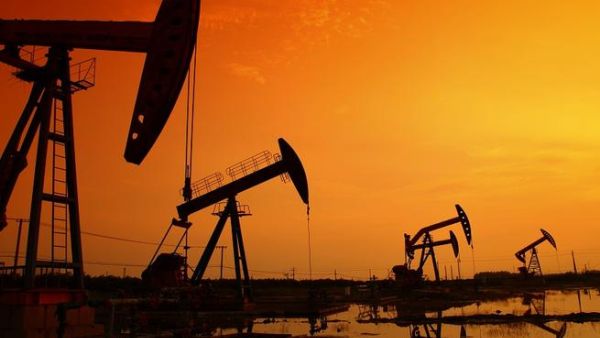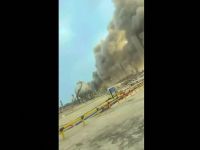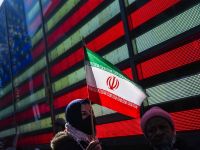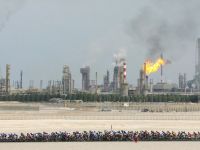UAE Minister of Energy and Industry Suhail bin Mohammed Faraj Faris Al Mazrouei on Wednesday said 1.2 million barrels per day output cut target set by oil producers can be revised as per market requirements.
"That number is going to change if we have different fundamentals. It was 1.8 million barrels per day before, and then it was increased and then adjusted to 1.2 million barrels per day. We may have another number, if world's oil supply-demand balance requires the adjustment," the minister said during the Bloomberg Invest Abu Dhabi summit.
Brent futures rose 44 cents to $71.05 a barrels barrel by 1446GMT on Wednesday. US West Texas Intermediate (WTI) crude oil futures climbed 24 cents to $64.22 a barrel. Brent and WTI crude oil futures have risen by about 30 per cent and 40 per cent, respectively, since the start of the year.
On an optimistic note, Al Mazrouei said there's a 'high probability' to achieve balance in market by year end.
"We can reach it. We are seeing some improvement on the inventory adjustments. It's happening but the job isn't complete," he said, adding that the decision to extend production cuts or increase production will be taken either at the joint ministerial monitoring committee meeting in Jeddah next month or Opec meeting in June.
Oil markets have tightened this year because of supply cuts by the Organisation of the Petroleum Exporting Countries (Opec) and allies including Russia, a group known as Opec+. US sanctions on oil exporters Iran and Venezuela also have an impact on oil market.
"With geopolitical risks continuing to impact production from Venezuela and Iran and now also potentially Libya and even Algeria, the crude oil market is likely to remain supported until the price reaches a level that is satisfactory for Opec and Russia," said Ole Hansen, commodity strategist at Saxo Bank.
UAE Exports 22 Million Crude Oil Barrels to Japan in February
UAE Focuses on Asia to Expand Non-Oil Foreign Trade
Monitoring the market
"We are monitoring the conformity. The meeting in Jeddah is going to highlight few things. There are several moving parts that can affect the decision to continue or not. But the objective is going to stay the same - to keep the market in balance targeting the five-year average. Even though we are not fully convinced that is the best target or benchmark but that's what we have."
The minister said March is a 'step-up' in terms of conformity level and commitment from all of the producers but there was need for 'additional conformity' from countries like Nigeria and Iraq - the No. 2 producer with 15.1 per cent share in production.
He also hoped Russia too follow the output cuts target. "I don't see any reason for Russia not to continue with us," the minister said.
Nopec a 'bad idea'
Meanwhile, Al Mazrouei said the US Congress considering the No Oil Producing and Exporting Cartels Act (Nopec), which exposes Opec members to the US antitrust lawsuits, is a 'bad idea'.
"It's going to affect volumes from the US. It will destroy value. The market will be open to all and everyone is going to dump."
He reiterated the Opec lends balance to the market.
"What happened to the market when Opec didn't take further action from 2014 to 2017. What happened to the US numbers," he asked and added without Opec there will be chaos.
He noted an uncontrolled market is a huge risk.
"There is a need for balance between supply and demand. You will create the right price which is good for the consumers and producers. If Opec isn't there, one year you will see $20 and investors will lose significantly and in couple of years you will see $100 plus. Both options are not good and sustainable for the world economy. We have seen what happened to world economic growth when oil prices were so low and also seen some slowdown when oil prices are too high. Target is not the price but to achieve a balance. Once we achieve that balance, we will have a good year from economic growth and for investors in other sectors as well."
UAE not to jump gun
Separately, the minister said the UAE can raise production to 3.5 million barrels per day but will not do unless needed. "Last year, the UAE's production went as high as 3.4 million barrels per day. We can hike production to 3.5 million barrles per day, if it is needed. We need to have eligible requirement from the market and from our consumers."
He said the UAE will not produce volumes which aren't required.
"We are not going to jump the gun. We are going to do what is required to monitor and control the market. We will not produce the volume that is not required by the market yet." As the financial experts at the summit hinted at $70 per barrel by end of year, the minister said it was level of investments and inventory balance, which were good benchmark to set prices.
"We have seen great deal of investments but only in the US and that's not enough. If investments aren't happening then we aren't going to be immune from huge fluctuations in the future."
More UAE, Saudi cohesion
Al Mazrouei said the UAE and Saudi Arabia were aligned by the vision to drive joint investment and optimisation and noted there was a new line of thought process - 'thinking outside the box'. He said the UAE and Saudi Arabia would collaborate and work together in a third country.
"We have seen it in joint efforts in refinery in India. I think that's just the beginning."
Al Mazrouei said the leadership at Aramco and Adnoc are brainstorming together to add value to both the stakeholders. "Each company is after additional value."
{"preview_thumbnail":"https://cdn.flowplayer.com/6684a05f-6468-4ecd-87d5-a748773282a3/i/v-i-4…","video_id":"488e60a8-d4a0-4e09-9baf-bee6b3093e3e","player_id":"8ca46225-42a2-4245-9c20-7850ae937431","provider":"flowplayer","video":"Top 10 Airlines for 2019 "}








